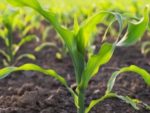Advertise Follow Us
Items Tagged with 'Carbon'
ARTICLES
No-Till’s a Better Dryland Investment Than Irrigation
Former Dakota Lakes Research Farm director says fixing nutrient, energy and water cycles is key to improving no-till
Read More
A Brief History of Carbon Markets
How global politics, market forces, environmental science and the back 40 are still colliding.
Read More
USDA Seeks Grower Input on Carbon Markets
Growers have until Nov. 1 to submit their comments to the federal agency.
Read More








